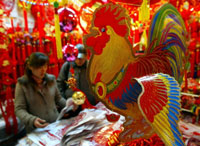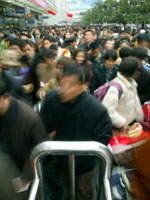




HONG KONG—China's leaders have welcomed the lunar new year with glitzy festivities among the Beijing elite. But millions of ordinary Chinese face the Year of the Rooster with deep anxiety over the basics of existence, according to Chinese officials, experts and ordinary people.
Many face unemployment, non-payment of pensions and wages, and homelessness.
Now the government has even auctioned off the land our home stands on.
"Some 40 million farmers have lost their land in the country," the government-backed China Academy of Social Sciences (CASS) said in a report released just ahead of the traditional Chinese holiday.
"With high-speed economic growth in China in recent two years, the people in the low-income group are more dissatisfied," the CASS study said. "That is because the basic prices for food have increased in fast economic growth, with food accounting for 50-60 percent of total spending."
The report, 2004-2005 Social Situation Analysis and Prediction , was cited in the official People's Daily online edition, and documented seven "austere" social problems demanding high-level attention. These include the "loss of farmland and a widening financial gap between rural and urban areas."

Villagers near the eastern city of Wuxi told RFA they would celebrate the new year with the threat of eviction looming over their heads.
"Now the government has even auctioned off the land our home stands on," a resident of Hongxiao village told RFA's Mandarin service. "This is unacceptable."
State media also reported that some 1.53 million workers had lost their jobs with Chinese state-owned enterprises in 2004, down from the 2.6 million who were laid off a year earlier.
But experts say China's unemployment rate is underestimated, as it excludes laid-off workers at state enterprises who still receive limited benefits like housing from their former employers.
It also omits hundreds of millions of people in the countryside who are either underemployed or entirely without a job. World Bank President James D. Wolfensohn recently estimated the number of China's rural poor--who lack adequate food, clothing, shelter, education and health services--at around 30 million.
Let all the people share the social wealth created by reform and development.
Of those who do have jobs, around 100 million, or 40 percent, are in "flexible jobs," according to the People's Daily Web site, suggesting they move quickly in and out of employment as market forces dictate.
Workers at the Dazhou No. 1 Cotton Mill in the southwestern province of Sichuan told RFA they would no longer accept their employer's flexible approach to paying them.
"They dock your wages every time there's a power cut, and there are always power cuts," one striking worker told RFA's Mandarin-language Labor Express program.
Another worker said: "We are not getting paid for the national public holidays at Spring Festival."
We are not getting paid for the national public holidays at Spring Festival.
Chinese leaders alluded to the country's litany of social problems in their new-year speeches.
"Let all the people share the social wealth created by reform and development," Premier Wen Jiabao told assembled Party leaders at the festivities, which are also known as Spring Festival in mainland China.
He called for "closer ties between the party and government on the one hand and the masses of the people on the other." He reiterated the need for a more humane style of government and respect for the rule of law, if social stability were to be preserved.
Wen has already warned publicly that rampant official corruption and abuse of power at every level could threaten the Communist Party's hold on power.

In a bid to push his administration's "people-centered" image ahead of the festival, President Hu Jintao visited the southern province of Guizhou, where rural families' average annual income is a tiny fraction of the national average of U.S.$1,000.
In Beijing, the Stalinist-style Great Hall of the People was bedecked for the new year with lanterns, fresh flowers, and inscriptions for happiness. "The banquet hall, decked out with blooming narcissus and fruit-bearing kumquats, was full of cheers and laughter," the official Xinhua news agency reported from the scene.
Even as the new year was ushered in, however, ordinary Chinese citizens complained of being thrown out of homes and farmland as local governments rush to cash in on a booming property market, often in breach of 30-year land leases and existing property contracts.
The banquet hall, decked out with blooming narcissus and fruit-bearing kumquats, was full of cheers and laughter.
The villager from Hongxiao village told RFA that around 200 households near his home had been demolished last month, and a further 400 were expecting theirs to be next on the demolition crew's list, despite a pending lawsuit.
"We went to make a complaint at the Land Resources Bureau in Beijing on May 25...but it was no use," the man told RFA's Mandarin service Monday. "We were forced to file a lawsuit at the No. 1 Intermediate People's Court. On Dec. 24 last year they still hadn't made a decision."
Villagers said the Land Resources Bureau had moved ahead with its demolition program anyway, in disregard of existing leases.
And at the Dazhou cotton mill, up to 2,000 workers began a strike ahead of the holidays after having most of their wages deducted for hours lost due to power shortages, sources told RFA reporter Han Dongfang.
"It's been going on for about four days now," one source told RFA, as millions of Chinese boarded trains, planes and buses to head home for festivities.
They dock your wages every time there's a power cut, and there are always power cuts.
Traditionally, Chinese New Year is a time when debts must be settled, but many people have received no wages or pensions for months, even years.
More than 360 billion yuan (U.S.$43 billion) in unpaid wages remains owed to migrant workers at thousands of projects invested by the government or real estate developers, officials said last August.
Many who are getting paid are forced to take deductions from their paycheck.
"Once they've deducted this and deducted that, the workers who are still working can only get around 300 yuan (U.S.$36) a month," the worker at the Dazhou Cotton Mill in Sichuan told RFA. "Those who have taken redundancy are on a basic subsistence payment of 130 yuan (U.S.$15)."
She said the mill was in bankruptcy proceedings and the plant and workers had been leased out to a private company.
"The workers are saying that it's not worth going to work, and asking for redundancy instead," she said.